- EasyCard
- Trade
- Help
- Announcement
- Academy
- SWIFT Code
- Iban Number
- Referral
- Customer Service
- Blog
- Creator
South Korea Work Visa Application Guide: Types, Requirements, and Fees Explained
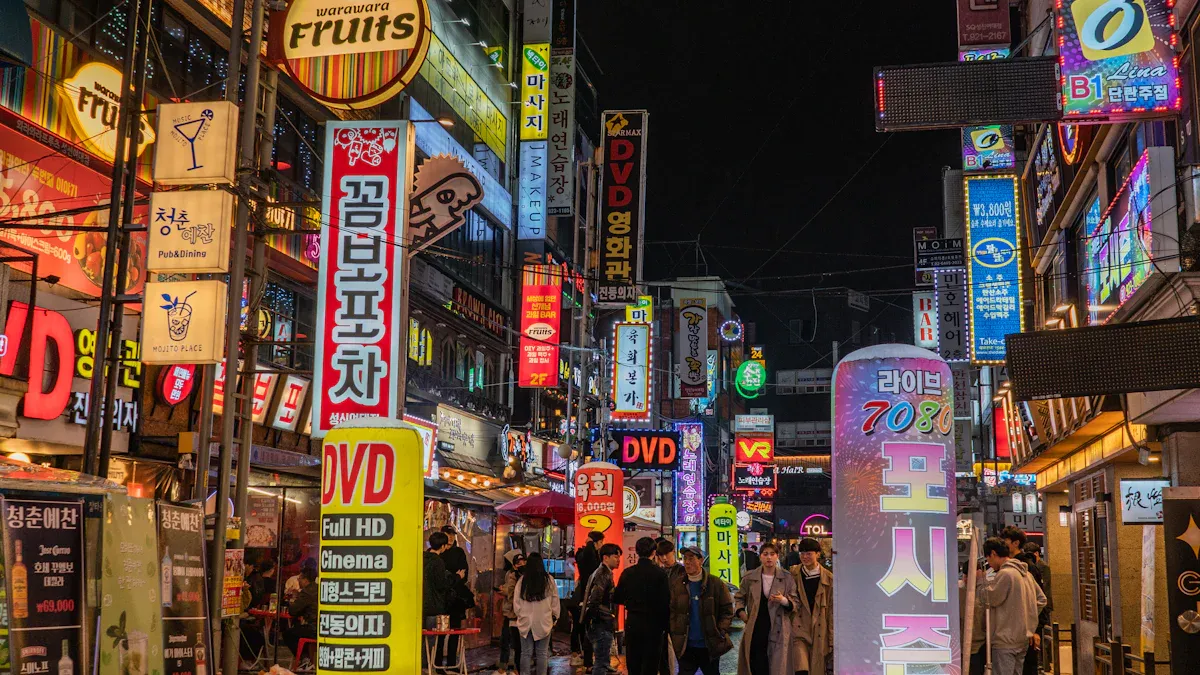
Image Source: pexels
When you plan to work in South Korea, you first need to understand the basic process of applying for a work visa. You need to choose the appropriate visa type, prepare documents, submit the application, pay fees, and wait for approval. Different visas suit different groups of people, with varying requirements. The average approval rate for South Korea work visas is 85%. You can refer to the table below to understand the visa success rates of major Asian countries:
| Country | Visa Application Success Rate |
|---|---|
| Singapore | 89% |
| Japan | 87% |
| South Korea | 85% |
It is recommended that you plan your time and budget in advance to improve your chances of success.
Key Points
- Understand the application process and prepare documents step-by-step to increase the visa application success rate.
- Choose the appropriate visa type based on your profession and needs to avoid rejection due to mismatched visa types.
- Ensure document completeness and accuracy to avoid delays in approval due to errors.
- Plan your time and budget in advance, arranging each step properly to ensure a smooth application process.
- Update personal information promptly and comply with visa regulations to avoid fines or deportation due to overstaying.
Work Visa Application Process
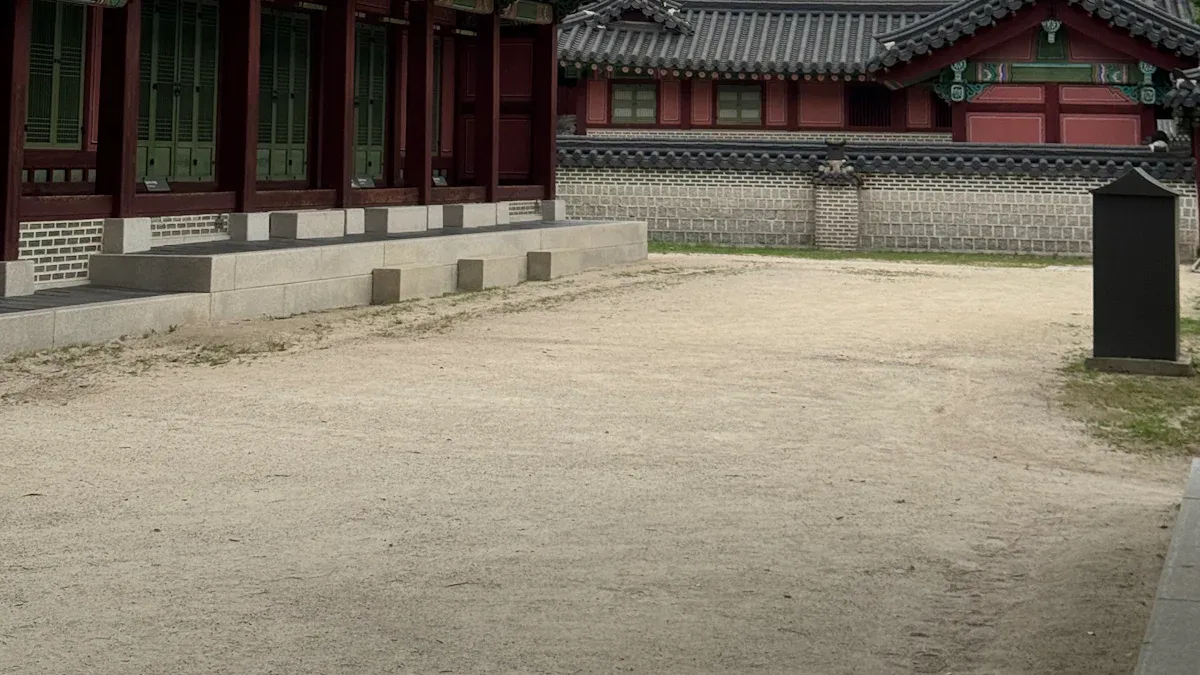
Image Source: pexels
Process Steps
When preparing a work visa application, you need to follow the official process step-by-step. The table below can help you clearly understand the main tasks and required documents for each stage:
| Step/Document | Description |
|---|---|
| Apply for Pre-Approval | You need to have your employer apply for visa pre-approval at the local Immigration Office in South Korea. |
| Submit Application | After obtaining pre-approval, you can submit the formal application at the South Korean Consulate in Hong Kong. |
| Obtain Visa | Once approved, you will receive a work visa, allowing a single entry into South Korea. |
| Alien Registration | After entering South Korea, you need to register at the local Immigration Office as soon as possible to obtain an Alien Registration Card (ARC). |
| Additional Documents | For specific visa types like E-7, you need to prepare additional materials such as qualification certificates or invitation letters. |
At each stage, you need to prepare the corresponding documents. For example, all work visa applications typically require a completed application form, original and copy of passport, and a color passport photo (3.5mm x 4.5mm). If you are applying for a self-employed visa, you also need to provide an employment contract, academic and professional certificates, a criminal record certificate, or a recommendation letter. Family visas require additional family relationship proof documents.
After completing the above process, you also need to register as a foreign resident in South Korea. You must complete this within 90 days of entry; otherwise, it may affect your legal residency and subsequent work arrangements.
Notes
During the work visa application process, you may encounter some common issues. Please pay special attention to the following points:
- Do not submit incomplete or inaccurate information. You need to carefully review all forms and documents to ensure travel dates, passport numbers, and name spellings are correct.
- Confirm that you are applying for the correct visa type. Different work visa types have different requirements, and choosing the wrong one can lead to delays or rejection.
- Check that all supporting documents are complete. Missing any document may result in rejection or the need to resubmit, affecting processing progress.
- After entering South Korea, you must apply for an Alien Registration Card within 90 days. Failure to do so may result in being considered an illegal resident.
- You need to update your address, visa status, and passport information promptly. Any changes must be reported to the Immigration Office.
- Do not overstay or work without a valid work permit, as this may lead to fines or deportation.
- You also need to pay health insurance fees on time to avoid affecting your legal residency due to non-payment.
Tip: You can obtain the latest work visa application policies and document checklists through the South Korean Consulate in Hong Kong or its official website. It is recommended to prepare in advance to avoid delays due to incomplete documents or errors.
By following the above process and notes, you can significantly increase the success rate of your work visa application. Planning your time and budget in advance and arranging each step properly will help you successfully start your career journey in South Korea.
Visa Types
When working in South Korea, you can choose different types of work visas based on your profession and needs. Each visa type applies to different groups and has different conditions. The table below helps you quickly understand the main visa types, descriptions, validity periods, and application conditions:
| Visa Type | Description | Validity Period | Renewal | Application Conditions |
|---|---|---|---|---|
| E-1 Professor Visa | For international workers teaching or researching at universities | 1 year | Renewable annually | Requires relevant academic qualifications and experience |
| E-2 Foreign Language Instructor Visa | For international workers teaching languages at language institutions | 2 years | Renewable every 2 years | Requires an employment contract and qualification certificate |
| E-3 Research Visa | For researchers in natural sciences or advanced industrial technology | 1 year | Renewable annually | Requires an invitation from a local institution |
| E-4 Technical Instructor/Technician Visa | For workers with experience in technical fields | 1 year or 3 months | Renewable annually | Requires an invitation from a local institution |
| E-5 Professional Visa | For professionals such as architects, lawyers, or doctors | 1 year or 3 months | Renewable annually | Requires government permission |
| E-6 Cultural Arts Visa | For individuals in music, arts, or literature fields | 1 year | Renewable annually | Requires a relevant work contract |
| E-7 Special Ability Foreigner Visa | For international workers with contracts for professional work | 1-3 years or 3 months | Renewable every 1-3 years | Requires an employment contract |
| D-5 Long-Term Journalism Visa | For media journalists | 3 months | Renewable annually | Requires a relevant work contract |
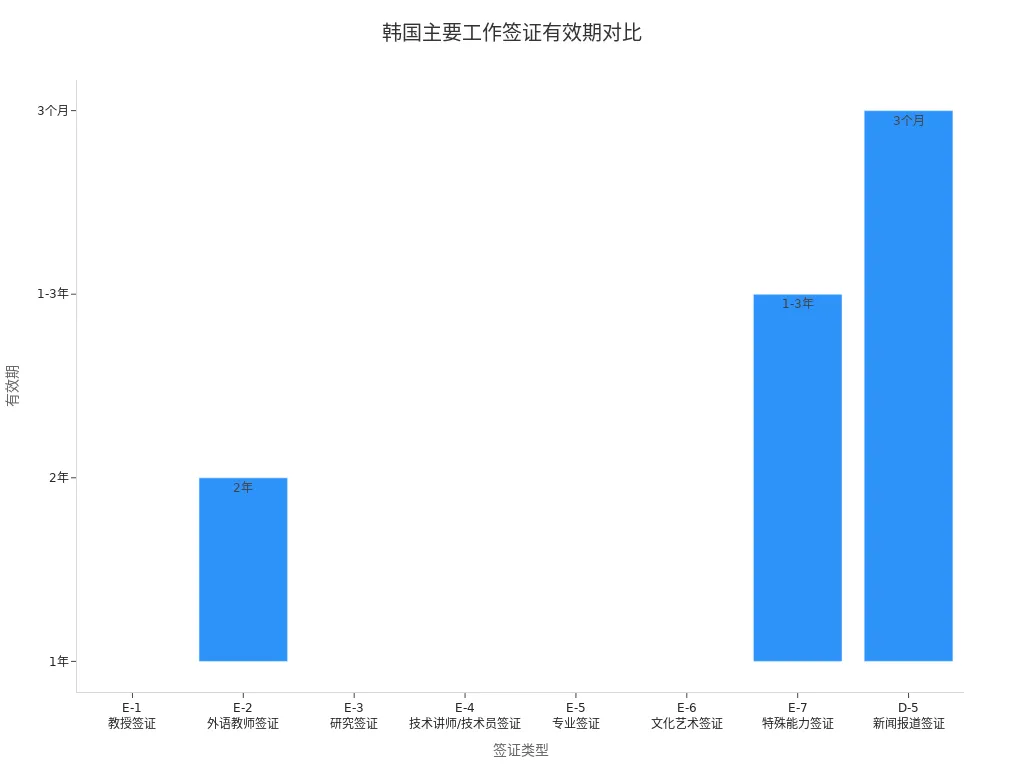
E-7 Visa
If you have professional skills or special abilities, you can consider the E-7 visa. The E-7 visa is suitable for foreign nationals working professionally in South Korean companies. You need a formal contract from an employer and relevant academic qualifications or work experience. The E-7 visa is typically valid for 1-3 years and can be renewed.
E-2 Visa
If you want to teach a foreign language in South Korea, you can apply for the E-2 visa. The E-2 visa is mainly for foreign language instructors. You need an employment contract and relevant qualification certificates. It is valid for 2 years and can be renewed every 2 years.
D-8 Visa
If you plan to invest or establish a company in South Korea, you can choose the D-8 visa. The D-8 visa is suitable for business investors and executives. You need to prove the investment amount and company operations. It is generally valid for 1 year and can be renewed.
D-10 Visa
If you have just graduated or are looking for a job, you can apply for the D-10 visa. The D-10 visa allows you to search for work or internship opportunities in South Korea. You need to provide proof of academic qualifications and basic financial support. It is valid for 6 months and can be extended once.
Other Types
South Korea also offers E-1 Professor Visa, E-3 Research Visa, E-4 Technical Visa, E-5 Professional Visa, E-6 Cultural Arts Visa, and more. You can choose the appropriate visa type based on your career direction. The application conditions and renewal policies for each visa type vary slightly. When applying for a work visa, you must choose the most suitable type based on your situation.
Work Visa Application Requirements
Education and Experience
When applying for a South Korea work visa, education and work experience are the most basic requirements. South Korea has clear educational thresholds for different visa types. You can refer to the table below to understand the minimum education requirements for various visa types:
| Education Level | Description |
|---|---|
| Associate Degree | You need to have (or expect to obtain) an associate degree from China/Mainland China. |
| Bachelor’s Degree or Higher | You need to have (or expect to obtain) a bachelor’s degree or higher from a university in China/Mainland China, or have completed academic or research projects. |
| Bachelor’s Degree or Higher (Domestic or Overseas) | If you plan to start a business based on intellectual property or technical skills, you need a bachelor’s degree or higher (including expected graduates). |
Different visa types also have work experience requirements. You can refer to the table below to understand the experience requirements for major visa types:
| Visa Type | Work Experience Requirements |
|---|---|
| E-1 Professor | You need to be a qualified individual as defined under the Higher Education Act, willing to teach or conduct research at educational institutions. |
| E-3 Research | You need to engage in scientific or high-tech research at universities, national institutes, or non-profit research institutions. |
| E-7 Specific Activities | You need to possess specific knowledge, skills, or expertise as defined under Article 16 of the Immigration Act. |
| D-2 Student | You are studying in an accredited university program and may work under specific conditions. |
| D-4 Intern | You are studying in a non-accredited program and are generally not allowed to work in South Korea. |
When preparing a work visa application, you need to choose the appropriate visa type based on your education and experience. If your education or experience does not meet the requirements, it is recommended to supplement relevant qualifications in advance.
Employer and Contract
South Korea has strict requirements for employer qualifications and employment contracts. You must obtain a formal invitation from a South Korean employer and sign an employment contract. The table below summarizes the main employer qualification requirements:
| Requirement | Description |
|---|---|
| Valid Passport | You need to hold a valid passport. |
| Signed Employment Contract | You need to provide an employment contract or work invitation signed by a South Korean employer. |
| Qualification Certificates | You need to submit proof of qualifications such as academic or professional certifications (if applicable). |
| Employer Registration Proof | You need to provide proof of the employer’s registration with South Korean authorities, such as a business registration. |
| Labor Law Compliance | You need to confirm that the job content complies with South Korean labor laws, including salary and working conditions. |
When submitting documents, you need to ensure the contract content is accurate and the employer is legally registered. If the employer’s qualifications are not met or the contract is non-standard, the visa application may be rejected.
Tip: You can communicate with your employer in advance to confirm that all documents are complete to avoid delays due to contract or qualification issues.
Investment and Financial Capacity
If you are applying for an investment-related work visa, South Korea has clear regulations on minimum investment amounts. You can refer to the table below to understand the minimum investment amounts for different visa types:
| Visa Type | Minimum Investment Amount | Notes |
|---|---|---|
| F-2 | $1,200,000 | Investment in public commercial funds |
| D-8 | $75,000 | For entrepreneurs and business investors |
| F-2-12 | $1,200,000 | 2023 standard requirements |
| F-2-8 | $780,000 | Real estate investment requirements |
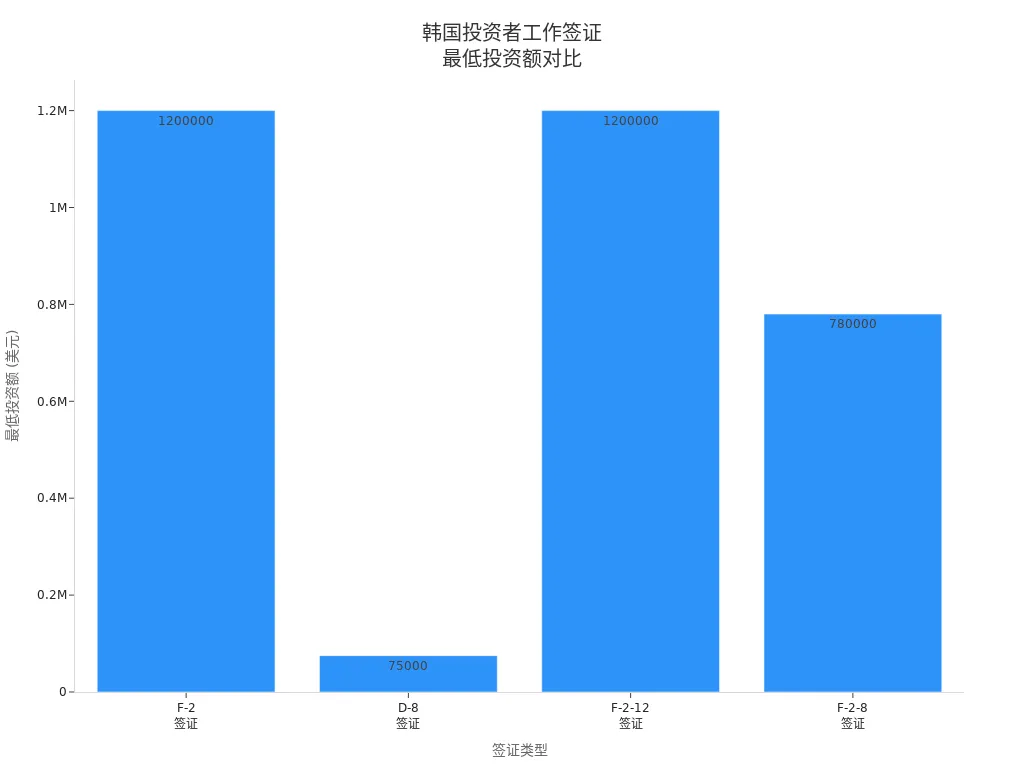
When preparing investment documents, you need to provide proof of funds, bank statements, and investment contracts. It is recommended to plan your funds in advance to ensure they meet the minimum investment amount. The South Korean Immigration Office will strictly review the authenticity and legality of the investment.
Health and Background
South Korea has clear requirements for health conditions and background checks. When applying for certain work visas (e.g., E-2 Foreign Language Instructor Visa), you need to submit a health certificate and a criminal record certificate. The health check process is as follows:
- Check the specific requirements for your visa type.
- Visit a medical institution approved by South Korean authorities.
- Schedule a medical checkup appointment.
- Undergo health checks, including infectious disease tests.
- Obtain a health certificate issued by the medical institution.
- Submit the health certificate with your visa application documents.
- Await the Immigration Office’s approval results.
When undergoing a background check, you need to consent to the investigation in advance. South Korean institutions will use your personal information in accordance with the Personal Information Protection Act. You need to submit a criminal record certificate to ensure you have no significant criminal history.
Note: E-2 visa applicants must submit a health certificate, criminal record certificate, and degree certificate. Other visa types may have similar requirements, so please check official policies in advance.
When preparing work visa application materials, you need to ensure all health and background documents are authentic and valid. Incomplete or inaccurate documents will affect the approval outcome.
Document Checklist
Contract and Certificates
When applying for a South Korea work visa, you must prepare complete contracts and relevant certificates. The table below lists common required documents:
| Document Name | Description |
|---|---|
| Employment Contract | Signed by a South Korean employer, specifying job position and duration |
| Academic Certificate | Proof of associate degree or higher from China/Mainland China |
| Professional Qualification Certificate | Such as teacher qualifications or technical certificates (depending on the position) |
| Work Experience Proof | Work experience in the relevant industry or recommendation letters |
You need to ensure all certificates are authentic and valid. Some positions also require professional qualification certifications. It is recommended to confirm document requirements with your employer in advance to avoid omissions.
Criminal Record
South Korea places great importance on background checks for applicants. You need to provide a criminal record certificate. Typically, you can apply for this certificate at a public security agency in China/Mainland China. Some visa types also require a criminal record certificate for the past five years. You should ensure the certificate is still valid when submitted.
Tip: If you have resided in another country for more than six months, you also need to provide a criminal record certificate from that country.
Korean Translation
All foreign-language documents you submit need to be translated into Korean. The South Korean Immigration Office has the following requirements:
- All foreign-language documents must be translated into Korean.
- Use certified translation services to ensure accuracy and acceptance.
- If necessary, perform notarized translations.
The notarized translation process is as follows:
- Find a licensed notary public through online directories or by visiting licensed banks or courts in Hong Kong.
- Bring original documents and valid identification to the notary public.
- Sign the documents in the presence of the notary public.
- The notary public stamps and signs the documents, certifying the accuracy of the translation.
Notarized translation is a professional translation performed in South Korea and certified by a notary public. The notary public does not verify the content of the documents, only certifies that the translation matches the original. You should arrange translation and notarization in advance to avoid delays due to unqualified documents.
Fee Details
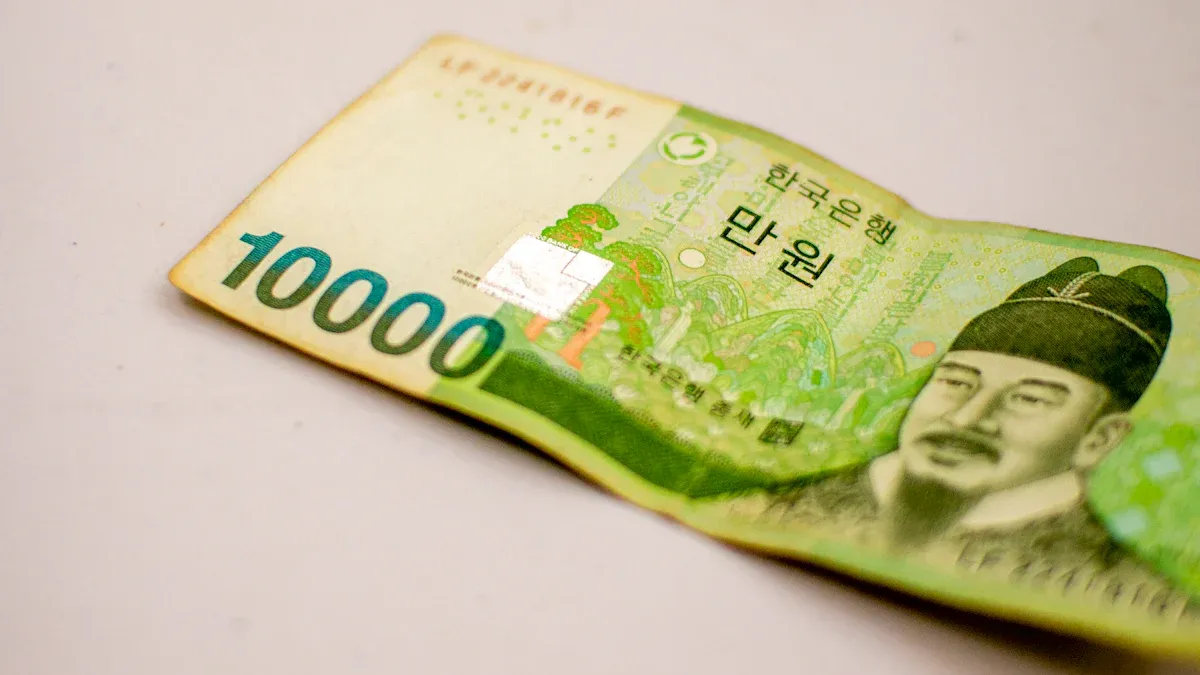
Image Source: unsplash
Official Fees
When applying for a South Korea work visa, you need to understand the official fees for different visa types. The table below lists the official fee standards for common visas (in USD):
| Visa Type | Official Fee (USD) | Notes |
|---|---|---|
| D-8 Investment Visa | 0 | No visa fee |
| E-7 Professional Visa | 120 | Single entry |
| E-2 Foreign Language Instructor Visa | 120 | Single entry |
| D-10 Job Seeker Visa | 120 | Single entry, requires proof of financial capacity |
| Work Holiday Visa | 54 | Fees vary slightly by country |
| Other General Visas | 120 | Single entry |
South Korea’s work visa fees are at a moderate level internationally. For example, the work holiday visa fee is approximately USD 54. Compared to other Asian countries like Singapore and Japan, South Korea’s visa fees are relatively competitive. You can refer to the table above to plan your budget accordingly.
Tip: Some visas, such as the D-8 Investment Visa, are exempt from visa fees, but you still need to prepare relevant documents and proof of funds.
Other Expenses
In addition to official visa fees, you need to account for additional expenses. These fees mainly include medical examinations, notarization, and translation. You can refer to the following common expense items:
- Medical Examination Fees: You need to complete a medical checkup at a designated hospital, including X-rays and blood tests. The checkup typically includes a medical history review, physical examination, gonorrhea test, chest X-ray, and blood tests (for applicants aged 15 and above). All applicants aged 2 and above also need tuberculosis (TB) testing. Medical examination fees vary by hospital and test items, typically ranging from USD 50-150.
- Notarization and Certification Fees: Documents such as academic certificates and criminal records need notarization and certification. Notarization fees are generally USD 20-50 per document, depending on the number of documents and the notarization agency.
- Korean Translation Fees: All foreign-language documents must be translated into Korean. Professional translation service fees are approximately USD 10-30 per page. Some documents require notarized translation, which increases the cost.
When preparing visa documents, it is recommended to understand the fee standards in advance and plan your budget accordingly. This can prevent delays due to insufficient funds.
Processing Time
Time Reference
When applying for a South Korea work visa, the processing time is a key concern. Generally, the standard work visa processing time is 10-15 working days. If you submit your application during peak periods, the processing time may be extended. If additional documents are requested, the approval timeline may also be prolonged. You can refer to the table below to understand processing times for different situations:
| Visa Type | Processing Time |
|---|---|
| Standard Work Visa | Approximately 10-15 working days |
| Peak Application Periods | Processing time may be extended |
| Additional Document Requests | Processing time may be extended |
Processing speeds also vary by region. For example:
- In Chennai, normal applications take at least 10 working days, while expedited applications take about 5 working days.
- In Bangalore, normal applications take at least 12 working days, while expedited applications take about 8 working days.
When preparing documents, it is recommended to reserve sufficient time to avoid delays affecting your start date or travel plans.
Tip: You can contact the South Korean Consulate in Hong Kong or relevant agencies in advance to inquire about the latest processing times and plan your schedule accordingly.
Reasons for Delays
When applying for a South Korea work visa, you may encounter some common reasons for delays. Understanding these factors can help you avoid risks in advance and improve application efficiency. Common reasons for delays include:
- Incomplete Documents: If the submitted documents are missing or incorrect, approval will be delayed.
- High Application Volume: During peak seasons, visa centers may process applications more slowly.
- Background Checks: Additional verification of education, work experience, or financial sources may extend the approval timeline.
- Medical or Security Issues: Problems with health certificates or security reviews may require more time for review by relevant authorities.
- Errors in Application Forms: Inaccurate information may lead to requests for additional documents or even rejection.
Before submitting your application, carefully review all documents to ensure accuracy. This can effectively shorten the processing time and help you obtain the South Korea work visa smoothly.
Selection Advice
Profession and Employer
When choosing a South Korea work visa, you first need to consider your profession and the nature of your employer. Different professions and employers correspond to different visa types. You can refer to the following common scenarios:
- E-1 Professor Visa: Suitable for individuals teaching or researching at higher education institutions.
- E-2 Foreign Language Instructor Visa: Suitable for foreign teachers teaching conversational languages at accredited institutions.
- E-3 Research Visa: Suitable for researchers working at designated research institutions.
- E-4 Technical Instructor/Technician Visa: Suitable for professionals engaged in technical guidance or technology transfer.
- E-5 Professional Visa: Suitable for architects, lawyers, doctors, and other professionals with qualification certificates.
- E-6 Cultural and Arts/Entertainment Visa: Suitable for artists, performers, and other cultural professionals.
- E-7 Special Ability Foreigner Visa: Suitable for designated occupations requiring professional skills.
- D-Series Visas: Suitable for intra-company transferees.
- F-Series Visas: Suitable for overseas Koreans.
- E-9 Visa: Suitable for non-professional employees.
You need to choose the most suitable visa type based on your actual job content and employer type. This can increase the approval rate and avoid rejection due to mismatched visa types.
Personal Conditions
When choosing a visa type, you also need to evaluate your personal conditions. Consider the following two aspects:
- Purpose of Stay: Are you coming to South Korea for long-term work, short-term internships, or job searching? Different purposes correspond to different visa types.
- Applicant Qualifications: Do you have the required education, professional skills, work experience, or investment capacity? Each visa type has specific qualification requirements.
You should first clarify your goals and then compare the application conditions for each visa type to choose the most suitable path.
Common Pitfalls
When applying for a South Korea work visa, you may encounter some common pitfalls:
You may focus only on the job title and overlook employer qualifications and job requirements. You may also mistakenly assume that all foreign nationals can apply for the same visa type. In fact, different visas have distinct requirements for education, experience, employer type, and job content. You also need to note that some visas, such as E-2 and E-7, have strict requirements for health certificates and criminal records, and incomplete documents will directly affect approval.
It is recommended to carefully review all conditions and documents before formally submitting your application. If necessary, consult professional agencies or the South Korean Consulate in Hong Kong to ensure accurate selection and preparation.
When applying for a South Korea work visa, you need to plan each step in advance. Please follow this sequence:
- Your employer applies for a Certificate of Visa Issuance (CCVI) on your behalf.
- The Immigration Office reviews and issues the CCVI.
- You submit the application with the CCVI to the South Korean Embassy or Consulate.
- Collect the visa upon approval.
- Complete alien registration within 90 days of entering South Korea.
You should choose the appropriate visa type based on your conditions and prepare documents such as contracts, academic certificates, and criminal records. It is recommended to stay updated on policy changes to avoid delays due to outdated information. If you have questions, you can consult professional agencies or embassies/consulates. The table below lists commonly used official information channels:
| Resource Name | Link |
|---|---|
| South Korea Ministry of Justice Immigration Service | http://immigration.go.kr |
| Hikorea Website | http://hikorea.go.kr |
| South Korean Embassy | https://overseas.mofa.go.kr/ |
FAQ
1. Can you apply for a South Korea work visa from a country other than China/Mainland China?
You can submit your application at the South Korean Embassy or Consulate in your country of residence. You need to prepare all documents and meet local requirements.
2. How far in advance should you prepare visa documents?
It is best to start preparing 1-2 months in advance. This allows time to complete any missing documents and avoids delays due to incomplete materials.
3. Can you continue using an existing visa after changing employers?
After changing employers, you need to apply for a change with the South Korean Immigration Office. You cannot continue working with the original visa directly.
4. What procedures need to be completed in South Korea?
Within 90 days of entering South Korea, you need to apply for an Alien Registration Card (ARC). You also need to update your address and visa status on time.
5. Can you pay visa fees in RMB or HKD?
You need to pay visa fees as required by the South Korean Embassy or Consulate. In most cases, fees are settled in USD.
You have thoroughly analyzed the South Korea work visa application guide, clearly understanding the requirements for various visas like E-7, E-2, and D-8, the complex documentation needed (employment contract, academic verification, criminal record check), official fees, and processing times. As you prepare to start your career in Korea, you also recognize that the traditional visa process is time-consuming (10-15 business days), and subsequent matters like asset management and cross-border remittances will require separate financial services.
After successfully obtaining your work visa, you will face daily cross-border financial needs, such as sending your Korean won earnings back home or managing your overseas assets. Traditional banking services often lack transparency in exchange rates and fees, while a professional cross-border fintech platform can provide you with more efficient and lower-cost asset management and remittance services.
BiyaPay is your ideal choice for connecting global assets and achieving high-efficiency cross-border fund flow. We provide real-time exchange rate inquiry and conversion services for fiat currencies, with remittance fees as low as 0.5% and zero commission on contract limit orders, effectively reducing your cross-border fund transfer costs. BiyaPay supports most countries and regions globally and enables same-day fund arrival, significantly improving capital turnover efficiency. Furthermore, you can use one platform to manage global asset allocation, including US and Hong Kong stocks, without needing a complex overseas account, and benefit from the seamless conversion between fiat and digital currencies like USDT. Register quickly with BiyaPay now, and use transparent fees and exceptional efficiency to provide strong financial support for your career in South Korea.
*This article is provided for general information purposes and does not constitute legal, tax or other professional advice from BiyaPay or its subsidiaries and its affiliates, and it is not intended as a substitute for obtaining advice from a financial advisor or any other professional.
We make no representations, warranties or warranties, express or implied, as to the accuracy, completeness or timeliness of the contents of this publication.




Contact Us
Company and Team
BiyaPay Products
Customer Services
is a broker-dealer registered with the U.S. Securities and Exchange Commission (SEC) (No.: 802-127417), member of the Financial Industry Regulatory Authority (FINRA) (CRD: 325027), member of the Securities Investor Protection Corporation (SIPC), and regulated by FINRA and SEC.
registered with the US Financial Crimes Enforcement Network (FinCEN), as a Money Services Business (MSB), registration number: 31000218637349, and regulated by FinCEN.
registered as Financial Service Provider (FSP number: FSP1007221) in New Zealand, and is a member of the Financial Dispute Resolution Scheme, a New Zealand independent dispute resolution service provider.



















